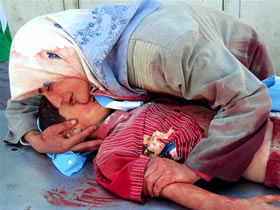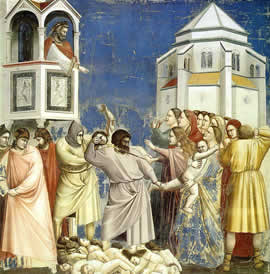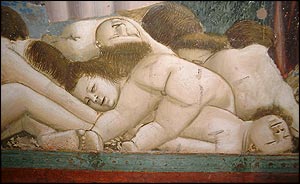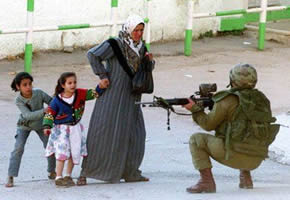Remembering Rachel:
The Slaughter of the Innocents
A guest essay by Pam Fickenscher. Pam is a Lutheran pastor, mother and writer living in Minnesota. She blogs regularly about ministry, motherhood, and the lectionary at http://pastorpam.typepad.com/living_word_by_word/.
For Sunday December 30, 2007
Lectionary Readings (Revised Common Lectionary, Year A)
Isaiah 63:7–9
Psalm 148
Hebrews 2:10–18
Matthew 2:13–23
 |
Iraqi mother weeps for her son who was killed by a sniper, September 2007. |
“I’m sorry,” she said, “but I can’t promise anything for the Christmas program this year. The very thought of three-year-olds in angel costumes is more than I can bear.”
“Of course,” I thought to myself. Last year I had made nearly daily visits to the hospital as our choir director kept vigil with her toddler son, born with a heart defect requiring a transplant. When Ellis died during Advent, a pall fell over our whole community. We rejoiced when, a few months later, she had enough energy to return to work, but we all knew that for these parents, life would never be the same; Christmas would never be the same; church would never be the same. “Unto us a son is born” will always taste a little bitter on their tongues.
Since I have my own healthy two-year-old at home, it has been hard not to turn away—first from Ellis’ broken body and then from his parents’ waves of grief, despair, and anger. I’ve been embarrassed at how easily I weep for Ellis and how little “professional distance” I can muster. I know their responses—and mine—are normal. As a pastor, I expect it. As a fellow mother, I can hardly bear it. It's too awful to think how fragile and unfair life is, too heart-wrenching to imagine my own son’s life torn away in this way.
A voice goes up in Ramah, Rachel weeping for her children
After we have all felt good about our generosity and best wishes for peace on earth around our Christmas trees, these texts wrench us back to reality like a winter wind, taking our breath away. We do not live in a peaceful snowglobe; we live in a world where children die and mothers grieve—not just occasionally, but every day, not just in hospitals but on city streets and in mud huts. We live in a world where the oppressed suffer and the oppressors get away, literally, with murder.
 |
Giotto, Slaughter of the Innocents, Scrovegni Chapel, Padua, c. 1305. |
There’s no getting around it: Matthew’s “slaughter of the innocents,” as the church has called it, is a god-awful text. Some of us may remember being taught “the Flight into Egypt” as children, usually in a matter-of-fact way, sometimes as an adventure story designed to make Mary and Joseph heroic, when in fact they were simply refugees. I don’t recall being terrorized by images of soldiers slaughtering babies, but I certainly got the point: this was one very dangerous world for Jesus. At the time, at least, I thought that our own world was safer for children.
You could make a good argument that we should save this story for another day—Lent, maybe, or some late night adults-only occasion. But our songs of peace and public displays of charity have not erased the headlines of child poverty, gun violence, and even genocide. This is a brutal world. Today the victims are statistically less likely to be Jewish and more likely to be from Darfur, or Zimbabwe, or Iraq, but the sounds of Rachel weeping for her children are not uncommon. If we could hear them, they would drown out our cheerful, tinny carols every 20 seconds or so.
It’s also the same world Jesus’ ancestors were born into, that long line of men and women Matthew relays in chapter one. Shall we count how many of them buried a child? Let’s be clear: Jesus is a Jew, and as such, in the biblical world, he is always at risk.
Matthew doesn’t just tell this story as news. It's a story in the most literary sense, one designed to draw us beyond ‘what happened to them’ to the depths of ‘what is happening to us.’ Reading about a Joseph with prophetic dreams should remind us of another righteous man who ended up exiled from his family in Egypt. Hearing of baby boys slaughtered by the empire would remind Matthew’s readers of the way Moses narrowly escaped that fate as well. And any Jew hearing this story in 1st century Palestine would remember the more recent terrors under Antiochus, when any mother caught circumcising her son would be rewarded with a dead baby hung around her neck.
 |
Giotto, Slaughter of the INNOCENTS. |
There is another memory Matthew wishes to stir up here, though, one with hope. The evangelist is quoting Jeremiah 31:15, which called to mind the matriarch Rachel as the Babylonians sacked Jerusalem and marched families off into exile. Rachel’s weeping occupies a key turning point in Jeremiah, when the prophet shifts from declaring God’s judgment to promises of hope. "Keep your voice from weeping . . . there is hope for your future . . . your children shall come back."
Why Rachel? The ancient rabbis tell a story (midrash) of God’s response to this pivotal tragedy in Judah’s history. Jeremiah, they say, called up Moses from his grave, who in turn called the patriarchs to bear witness as the exiles left their homes. Each of them responds with indignation.
“Lord of the world, I did not protest but willingly let myself be bound on the altar and even stretched out my neck beneath the knife. Will you not remember this on my behalf and have mercy on my children?,” Isaac protests. (Rachel, by Samuel Dresner, Fortress Press).
God is not moved, not by Abraham or Isaac or Jacob or Moses himself, until finally Rachel stands before God, and her words alone turn the tide. Although Rachel is a biological ancestor for only two of the original twelve tribes, she is recognized in Jeremiah as mother of all, and even God has to respond to her insistent plea for mercy. Fairness has nothing to do with it; it is the promise of one parent to another: your children will come back.
Matthew, in turn, invokes Rachel in the midst of this story of God-with-us, the birth of a child whose name is a verb: save. God’s salvation may seem far off and inadequate to the mothers who mourn, but the promise is deeper than this moment in time. The threat of this Herod passes for a time, only to be replaced by another Herod, yet another ruler without scruples. But when this child of Rachel returns to Jerusalem as an adult, God enters into the fate of every doomed child and every bereft parent.
 |
For Christians, the birth of Christ can and must remind us that there can be no cheap comfort for those who mourn their children. Cute pageants and pious carols do nothing to stop the devastation of those who have lost a child—for any reason. Toys for Tots and even our best legislation for child health don’t make that big of a dent either. Only something deeper, God’s entering into this world of sorrows, will accomplish the depth of healing, the salvation we need.
This is not a cheap kind of sympathy, a soothing cliché that it will all work out in the end. Mothers still wail, daily. But if God is with us, then perhaps we can bear to listen to the cries of sorrow and pleas for justice of our time too, knowing that all our weeping is gathered up by the one who will turn it into dancing. Nothing, not even death, can separate us from our children, our parents, and even from our enemies. Nothing, not even a bottomless pit of grief or the intractable legacy of injustice, shall keep God away from being with us, yes, from saving us.
For further reflection:
*
What is your visceral response to the "slaughter of the innocents?" Do you identify with those who are rescued or those left behind?
*
What contact do you have with exiles and refugees in your life? In what way can this season be a time to support them?
* Reflect on the words of Stanley Hauerwas (Matthew; Brazos Theological Commentary on the Bible, 2006): "Perhaps no event in the gospel more determinatively challenges the sentimental depiction of Christmas than the death of these children. Jesus is born into a world in which children are killed, and continue to be killed, to protect the power of tyrants [like Herod]."
Image credits: (1) Picasa Web Albums, A.H.'s Public Gallery, IRAQ6; (2) Mark Harden's Artchive; (3) BBC News online media; and (4) Independent Media Centre Ireland, Sunday, April 24, 2005, article 69545.





